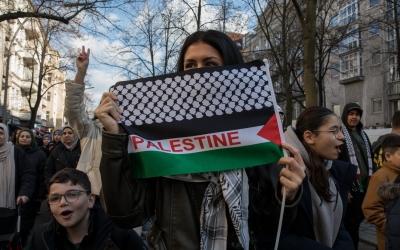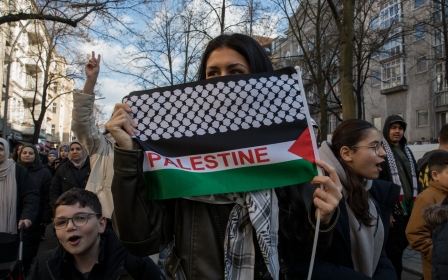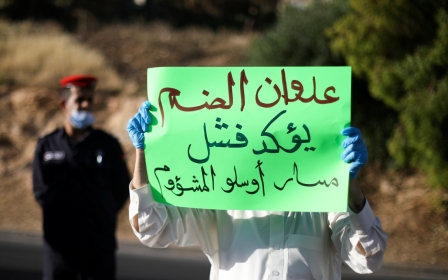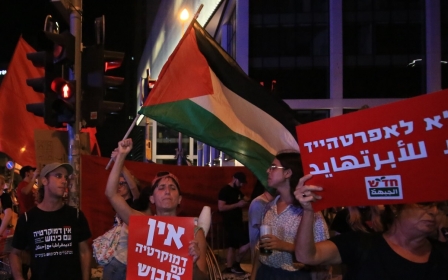Oslo accords: Thirty years of peace distortion

Three decades on, the Oslo accords framework continues to affect and shape major aspects of Palestinian life and death. Since its inception and adoption, Oslo has created processes, institutions, and arrangements in Palestinian society that have resulted in major structural transformations and deficiencies, particularly in the occupied the West Bank and Gaza Strip.
The Oslo accords framework distorted Palestinian civil society, redefined and reconceptualised key pillars of the social contract, and further fragmented and divided the Palestinian people.
It solidified Palestinian economic dependence on, and asymmetrical containment by, the Israeli economy, creating an economy that is inherently reliant on international aid and institutionalising a process that denied the Palestinian right to development.
The Oslo accords-driven PA security paradigm was preset with structural defects meant to deny Palestinians any relief from the main cause of their insecurity, the Israeli occupation.
Politically, the Oslo framework led to the domination of personal styles of governance over inclusive, accountable, and participatory approaches.
This inevitably alienated the Palestinian people from the core of the political system and governing bodies by breeding corruption and failing to establish effective mechanisms of accountability and transparency.
Such flaws are neither accidental nor unintended; they are integral to the design of the Oslo Accords and constitute fundamental prerequisites for the "peace and state-building" processes.
Yet every September, Palestinians are reminded that their political leadership is fixated on a failed and obsolete framework that denies their fundamental rights.
They are also reminded that the notion of peace dwindled to a mere function of a securitised arrangement between the occupied and the occupier to preserve the status quo and imbalance of power.
The Oslo framework therefore violates Palestinian rights - including safety and security - and reinforces the multi-layered system of subjugation, control, and repression that Palestinians have long endured. Thirty years on, Oslo has proven to be neither an avenue for peace nor a framework that will bring the Palestinian people any closer to realising their inalienable right to self-determination.
If anything, it has made Palestinians weaker and more fragmented and the prospects of statehood - let alone equality, justice, and freedom - more distant.
Designed to fail
The Oslo Accords did not entirely fail. But they certainly failed the Palestinian people and distorted the fundamental meaning of peace.
They did not fail Israel - the occupying power - and its allies. Oslo offered Israel an internationally-sponsored framework to sustain its occupation and cement its colonial control over Palestine and the Palestinian people in the West Bank and Gaza Strip over the last 30 years.
Among other things, it imposed an inflated bureaucracy, comprising the Palestinian Authority's (PA) security establishment, which functions within the parameters of an agreement that was precisely designed to inhibit Palestinians' struggle for freedom and self-determination.
The security sector of the PA, heavily supported by external actors and employing around 44 percent of all civil servants, accounts for nearly $1bn of the PA's budget and absorbs approximately 30 percent of the total international aid disbursed to Palestinians.
The PA's security sector, with its multiple institutions and bodies, consumes more of the PA's budget than the education and agriculture sectors combined. The ratio of security personnel to the population is estimated to be as high as 1 to 48, one of the highest in the world.
Such conditions, however, have failed to offer any increased security for the Palestinian people. The Oslo Accords-driven PA security paradigm was preset with structural defects meant to deny Palestinians any relief from the main cause of their insecurity, the Israeli occupation. It includes the PA's infamous security coordination aimed at ensuring, first and foremost, Israeli security.
The paradigm of security coordination started and emerged over the first two decades of the PA's existence as a "contractual obligation" due to the different internationally-sponsored interventions and security sector reform plans (all within and dictated by the Oslo Accords framework and its derivatives). But over the past decade, it transformed into deep-rooted institutional behaviour and formal identity, even becoming a firm belief that is engraved and entrenched in the minds, perceptions, and actions of the PA's current and future leadership.
Sustaining the occupation
Over the years, the PA leadership has passionately and uncompromisingly argued that it views security coordination as a bridge to fight against radicalisation and violence "that should lead us to our independence", while also insisting that security coordination "is part and parcel of our liberation strategy". Yet the vast majority of the Palestinian people are against security coordination as a modus operandi of the PA and its security establishment.
The only time the PA can and will really stop security coordination with Israel is when the PA ceases to exist
The PA's leadership is aware of this stark divide but remains unwilling and unable to bridge this gap through concrete implementable steps that go beyond empty promises and mere declarations.
Although the PA declared over 60 times that it has stopped or is stopping security coordination, it continues to be in full swing, especially at a time of heightened Palestinian popular mobilisation, confrontation, and armed resistance.
This is why the only time the PA can and will really stop security coordination with Israel is when the PA ceases to exist - at least in its current shape, form, functionality, and leadership.
Built into the Oslo security coordination plan is the criminalisation of Palestinian resistance, the "professionalisation" of Palestinian authoritarianism, and the constant threat to the safety of Palestinians, who are subjected to additional layers of repression in an already highly oppressive context.
Therefore, the only meaningful avenue to engage constructively with Palestine-Israel is to first acknowledge its reality as a struggle against settler colonialism and apartheid, which control all conditions on the ground.
Anything else would be sidestepping the problem and not addressing the issues from their roots.
For three decades and counting, the Oslo Accords have provided nothing more than a false "framework of peace" that only perpetuated the occupation and its abuses. It is past time to abandon the Oslo framework and its derivatives. By design and definition, peace and colonisation are incompatible paths, even if they may run in parallel.
As part of their liberation strategy, Palestinians must therefore dismantle these systems of domination and decolonise the structures of repression and control imposed on them, directly and indirectly, by internal and external powers.
In May 2021, when the revolting youth in Palestine declared that "liberation is within our reach", their message targeted both internal and external authorities. The clarity in the people's minds is what their leadership needs but cannot achieve without a compass pointing to dignity and freedom.
To be sure, security coordination between the PA and Israel is not the bridge that will lead the Palestinians to that but will be the bridge to nowhere.
Moving beyond a path dictated by the Oslo accords and its detriments requires a fundamental rethinking of the existing, dominant framework and questioning the role of the PA in the Palestinian struggle for self-determination.
Addressing and reversing the Oslo accords's structural deficiencies means adopting an "accountability and people first" paradigm. This will require the Palestinians to reinvent their political and governance system; to rebuild their democratic, representative, legitimate, inclusive, and effective leadership; and, finally, to redefine peace as an outcome of accountability, lasting justice, and equality - and reclaim its true meaning.
The views expressed in this article belong to the author and do not necessarily reflect the editorial policy of Middle East Eye.
Middle East Eye propose une couverture et une analyse indépendantes et incomparables du Moyen-Orient, de l’Afrique du Nord et d’autres régions du monde. Pour en savoir plus sur la reprise de ce contenu et les frais qui s’appliquent, veuillez remplir ce formulaire [en anglais]. Pour en savoir plus sur MEE, cliquez ici [en anglais].







